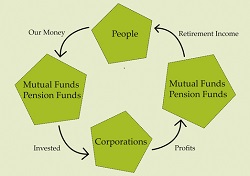|
People, Profits, & Pensions |
|
Louisiana in New York (Times, that is)
Friday, February 7, 2014
And while we might think of the Times as a newspaper, it's defining itself more broadly, as printed newspapers keep ceding ground to digital initiatives. It describes itself this way at its website, "The New York Times Company is a global media organization dedicated to enhancing society by creating, collecting and distributing high-quality news and information." The company announced its fourth quarter and full year 2013 results yesterday, Here's how it described the full year results in a news release, "...the Company had an operating profit of $156.1 million compared to $103.7 million in 2012. Excluding depreciation, amortization, severance and special items, operating profit in 2013 grew to $256.3 million from $245.2 million in 2012." That should please members of the Louisiana State Employees' Retirement System (LASERS), which owned 34,400 of the company's publicly traded shares on December 31st (based on data supplied at nasdaq.com). Here's how LASERS describes its membership,
According to nasdaq.com, more than 79% of the New York Times' 149 million shares are owned by institutional investors (primarily mutual funds and pension funds).
The Bigger Picture:Will Profits from Big Macs Add to Your Retirement Income?In 1948, the McDonald brothers redesigned and remodelled their drive-in restaurant in San Bernardino, California. Taking inspiration from Henry Ford's assembly-line, they created the fast food revolution, with the quick service and low prices we now take for granted. In that same year, the U.S. National Labor Relations Board ruled unions could include pension issues in contract negotiations. That ignited a massive expansion of pension plans. In the 1950s, pension funds started buying stocks, rather than just bonds or their equivalents; in addition mutual funds came of age. With these two developments working, middle class people became owners of big business. At first, their stakes were modest, but steadily growing. And in just a few decades, they gained controlling interests in many large corporations through their funds. Management guru Peter Drucker has called it, "...one of the most startling power shifts in economic history." Now, working people reap the benefits of those investments, collecting much of the profit distributed by McDonald's and other big corporations. Discover how the pieces fit together. In Big Macs & Our Pensions: Who Gets McDonald's Profits? - a new booklet -(about 25-pages), you will:
You may not be among the owners of McDonald's. But if you belong to any pension plan, or contribute to a mutual fund or whole life insurance policy, you likely own pieces of some big corporations. More importantly, though, your retirement income will be bigger and grow more dependably than you would otherwise expect. Big Macs & Our Pensions: Who Gets McDonald's Profits? is now available at Amazon.com
|

The Ownership Cycle
Copyright 2014. Robert F. Abbott, All Rights
Reserved.
|

 By: Robert F. Abbott, author of
By: Robert F. Abbott, author of  Did you know that many Louisiana state employees own a piece of the New York Times? Not
exactly two names you'd put together intuitively, but pensions, like politics, makes for strange
bedfellows.
Did you know that many Louisiana state employees own a piece of the New York Times? Not
exactly two names you'd put together intuitively, but pensions, like politics, makes for strange
bedfellows.